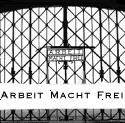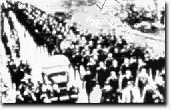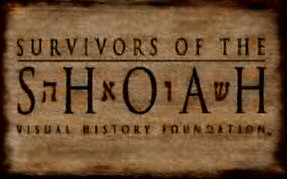 |
| In 1924, Adolf Hitler's book, "Mein
Kampf," was published. In it he set forth his political policies
for Germany, including his anti-Semitic doctrines, his clear denunciation
of the Jews, and his plans for solving the "Jewish Problem."
By 1932, with the fall of the Weimar Republic, the Nazi Party
had become the largest political power in Germany, and on January
30, 1933, Adolf Hitler became Chancellor of Germany. |

|
| By February 27, 1933 he began plans set forth in "Mein Kampf"
by first, dissolving the Reichstag (German Parliament) and then,
by calling for new elections to ensure the Nazi Party's absolute control
of the German Governement. |

|
| With the aid of his Minister of Propaganda, Josef Paul Goebbel,
and his very thorough use of propaganda, the German people were convinced
that by ridding Germany of "ethnic impurity" that most of the country's
problems would be eliminated. During the course of the year 1933 Dachau
was opened, |

|
| the Gestapo was established and Hitler had begun his segregation
and isolation of the Jewish Population. |

|
| By early 1934 he proclaimed himself "The Führer und Reichskanzler"
which means, Leader and Reich Chancellor. He then required the armed forces
to swear allegiance to him. And so began one of the darkest
periods in history, and so commenced the systematic annihilation of Jews,
. |

|
| and the persecution of other ethnic and religious groups while the
world watched and did little at first to stop the spread of Hitler's regime |
|
The Holocaust
is the name given to the destruction of some 6 million Jews by the
Nazis and their followers in Europe between the years 1933-1945. Other
individuals and groups were persecuted and suffered grievously during this
period, but only the Jews were marked for complete and utter annihilation.
The term "Holocaust" - literally meaning "a completely burned sacrifice"
- tends to suggest a sacrificial connotation to what occurred. The word
Shoah, originally a Biblical term meaning widespread disaster, is the modern
Hebrew equivalent.
 The above link takes you to The Shoah Foundation and
a visual history of the Holocaust. Actual survivors are
interviewed. It was begun by Steven Spielburg
shortly after his filming of Schindler's List in 1994
it is a moving account of the survivors and is entitled,
The above link takes you to The Shoah Foundation and
a visual history of the Holocaust. Actual survivors are
interviewed. It was begun by Steven Spielburg
shortly after his filming of Schindler's List in 1994
it is a moving account of the survivors and is entitled,
|
|
Reasons
to Study the Holocaust
Why
study the Holocaust? To answer simply...because the world must
never forget what happened there...and that we must always be on guard
for that kind of terrorism before it can take hold anywhere.
These words were spoken before the Holocaust, but they are as true
now as they were when they were originally spoken. The words
are Abraham Lincoln's and they are from the Gettysburg Address:
It is rather for us, the living, to be here dedicated to the
great
task remaining before us--that from these honored dead
we take increased devotion to that cause for which they
gave
the last full measure of devotion--that we here highly resolve
that these dead shall not have died in vain...
We
must be watchful of ANY situation where human rights are threatened.
I think this poem says it all .....
|
"First they came for the Jews"
In Germany they first came for the Communists
and I didn't speak up because I wasn't a Communist.
Then they came for the Jews,
and I didn't speak up because I wasn't a Jew.
Then they came for the trade unionists
and I didn't speak up because I wasn't a trade unionist.
Then they came for the Catholics
and I didn't speak up because I was a Protestant.
Then they came for me
and by that time no one was left to speak up.
-Pastor Neirnoeller
|
A Rememberance...
Wherever I go, I hear footsteps:
My brothers and sisters
on the road, in swamps, in forests,
Swept along in darkness,
trembling from cold,
Fugitives from flames, plagues,
and terror.
Wherever I stand, I hear rattling:
My brothers and sisters
in chains, in chambers of the stricken.
They pierce the walls and
burst the silence.
Through the generations
their echoes cry out
In torture camps,
in pits of the dead.
Wherever I lie, I hear voices:
My brothers and sisters
herded to slaughter
Out of burning embers,
out of ruins,
Out of cities and
villages, altars for burnt offerings.
The groaning in their
destruction haunts my nights.
My eyes will never stop seeing them.
And my heart will never stop crying "outrage":
Everyone will be called to account for their death.
The heavens
will descend to morn for them
The world and
all that is therein will be a monument
on their grave.
--Shin Shalom, translated by David Polish
|
|





